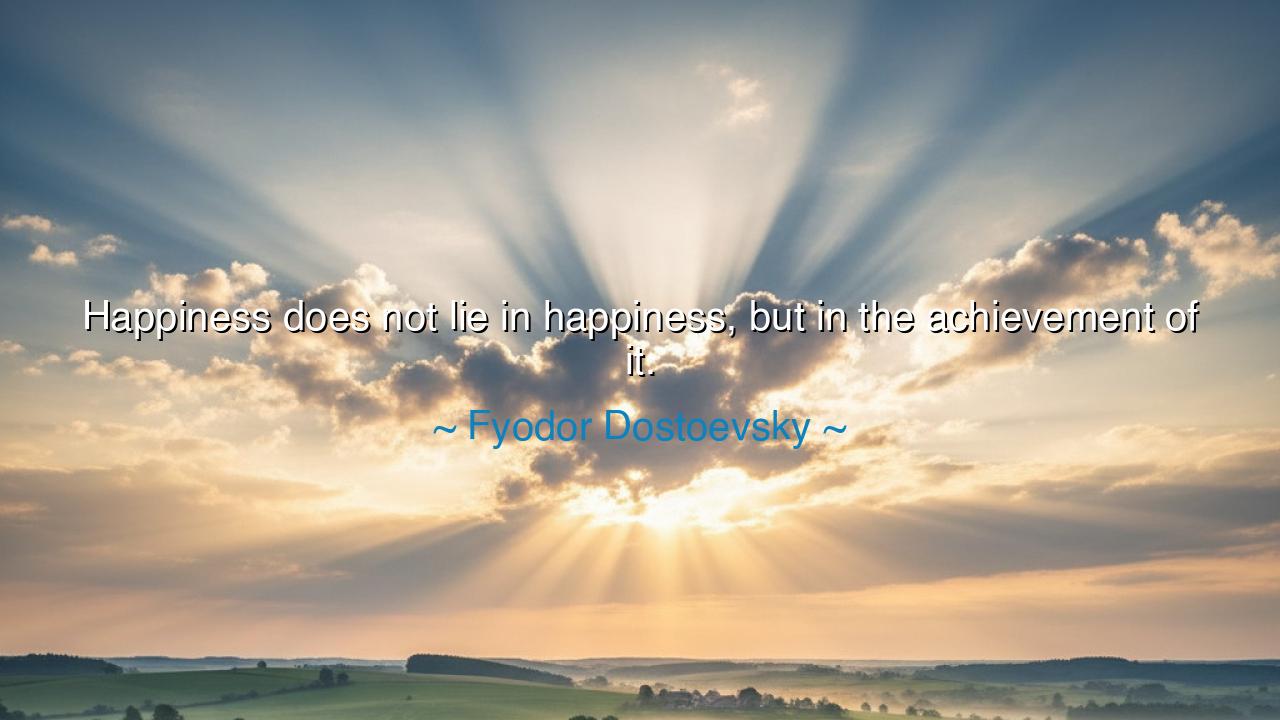
Happiness does not lie in happiness, but in the achievement of






“Happiness does not lie in happiness, but in the achievement of it.” Thus wrote Fyodor Dostoevsky, the storm-born prophet of Russia, whose pen carved the depths of the human soul as few before or after him ever dared. His words, like molten iron, bear both weight and fire. They reveal the ancient truth that happiness is not a destination, but a journey—not the golden crown, but the labor of earning it. For it is not in the having, but in the becoming, that the spirit of man finds its strength and peace.
Dostoevsky knew this truth through suffering. Exiled to the frozen wastes of Siberia, stripped of freedom, dignity, and health, he stood face to face with despair. Yet from the cold ashes of misery, he rose renewed, discovering that joy, like faith, is not given—it is forged. In his novels, the heroes who seek comfort perish in emptiness, while those who struggle, repent, and strive find a light that cannot be extinguished. He teaches that to live meaningfully is to struggle nobly; for happiness, when pursued for its own sake, becomes hollow, but when born from labor and courage, it becomes divine.
The ancients, too, spoke of this truth. The Greeks revered Heracles, who achieved immortality not by pleasure but by enduring twelve impossible labors. His glory was not in ease, but in perseverance. So it is with the human soul. The gods, it was said, cursed mankind not with suffering, but with the illusion that one might live without it. For without challenge, there can be no achievement—and without achievement, no lasting happiness. The seed must break to become the tree; the heart must strain to feel its own power.
Dostoevsky’s wisdom reminds us that the struggle toward happiness is itself the sacred flame of life. The artist who toils in obscurity, the mother who endures sleepless nights for her child, the seeker who labors for truth through failure and doubt—all are closer to the essence of joy than the man who lounges in comfort. For the sweetness of victory depends upon the bitterness of effort. The mountain’s view is precious only because of the climb. The soul that endures hardship does not merely survive—it awakens.
Think of Thomas Edison, who failed a thousand times before bringing light to the world. When asked if he had failed, he replied, “I have not failed; I’ve found a thousand ways that do not work.” His joy did not lie in the final glow of the bulb, but in the relentless pursuit that preceded it. That is the achievement Dostoevsky speaks of—the sacred labor that transforms the act of striving into fulfillment itself. For happiness that costs nothing teaches nothing, but happiness that is earned reshapes the soul into something greater.
This truth is as old as man and as urgent as dawn. In our age of ease and abundance, many chase happiness like a mirage, hoping to find it waiting at the end of comfort. But they forget that comfort dulls the edge of the spirit. Dostoevsky warns us: happiness cannot be handed down; it must be conquered. One must dare to live fully, to risk pain, to build and lose and build again. Only in this eternal striving does the heart find peace—not in stillness, but in movement; not in having, but in becoming.
So, my children of the new dawn, take this wisdom as your torch: seek not the ease of happiness, but the honor of its achievement. Embrace your challenges as the forge of your greatness. When the road is steep, do not curse the climb—it is proof that you are ascending. When your heart grows weary, remember that even the stars are born from pressure and flame. Let your joy be not in the fleeting comfort of what you hold, but in the everlasting fire of what you strive to create.
For Dostoevsky was right: the truest happiness is not found in the rest after the storm, but in the courage to face it. To struggle is to live, and to live is to rise—again and again—toward that divine summit where achievement and joy are one.






AAdministratorAdministrator
Welcome, honored guests. Please leave a comment, we will respond soon